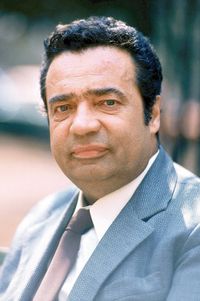Vladimír Mensík's life narrative unfolded on October 9, 1929, in the quaint and picturesque town of Ivancice, situated within the geographic confines of Czechoslovakia, a nation that would ultimately disintegrate into two separate and distinct political entities: the Czech Republic and Slovakia.
Vladimír Mensík's extraordinary odyssey as a thespian would etch an indelible mark across the cinematic expanse, as his captivating aura would illuminate the silver screen in a rich tapestry of iconic films, including the 1966 masterpiece Nahá pastýrka, the 1972 critically acclaimed Slamený klobouk, and the 1968 cinematic gem Klec pro dva.
Vladimír Mensík's life was a rich and complex entity, comprising not only his professional endeavors, but also a deeply personal and emotional journey. The fabric of his existence was intricately woven with the threads of love, companionship, and meaningful relationships. Two extraordinary women, Olga and Vera, occupied a prominent place in his romantic odyssey, each contributing their own distinctive essence and characteristics to his life.
Vladimír Mensík's life was abruptly and prematurely terminated on the twenty-ninth day of May, 1988, in the city of Brno, a metropolitan area that was then still an integral component of the Czechoslovakian state, a nation that was unified under a single government at the time, but would later undergo a significant transformation, ultimately becoming an essential part of the newly formed Czech Republic, a country boasting a storied past and a vibrant cultural heritage.
Vladimír Mensík's life was tragically cut short, yet his extraordinary abilities and profound effects on the entertainment industry have resulted in a lasting legacy that continues to thrive, a poignant reminder of the profound impact he had on the lives of those who had the privilege of knowing him and the countless individuals whose lives he touched through his remarkable body of work.
























